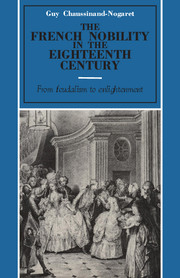Book contents
- Frontmatter
- Contents
- Introduction: the gilded ghetto of royal nobility
- 1 The Enlightenment and noble ideology
- 2 The nobility between myth and history
- 3 Plutocrats and paupers
- 4 The fundamental divide: culture
- 5 The nobility and capitalism
- 6 Rites and strategies: the marriage market
- 7 The nobility against the Old Regime
- 8 A plan for society
- Conclusion
- Afterword to the English edition
- Notes
- Bibliography
- Supplementary bibliography
- Index
1 - The Enlightenment and noble ideology
Published online by Cambridge University Press: 05 June 2012
- Frontmatter
- Contents
- Introduction: the gilded ghetto of royal nobility
- 1 The Enlightenment and noble ideology
- 2 The nobility between myth and history
- 3 Plutocrats and paupers
- 4 The fundamental divide: culture
- 5 The nobility and capitalism
- 6 Rites and strategies: the marriage market
- 7 The nobility against the Old Regime
- 8 A plan for society
- Conclusion
- Afterword to the English edition
- Notes
- Bibliography
- Supplementary bibliography
- Index
Summary
The eighteenth century can be characterised in a number of different ways. Whether it was a great bourgeois century or a great noble one, it was certainly the century of Enlightenment. But what divergent trends had produced this Enlightenment? Viewed as a bourgeois frame of mind, produced by an expansive social class coming up against the resistance of a society too rigid to accommodate its appetite for power, the Enlightenment looks very like the ideology of a frustration complex. Doubtless this is a one sided and socially unbalanced definition, but it does convey the sense of seemingly inbuilt dissatisfaction which scarred the consciousness and fertilised the thought of a century which ended in permanent revolution, and which spoke, felt, reasoned, and fantasised about revolution, in the written word and even in music, before it committed the act which made revolution a reality.
But who were the authors of this overture to both the exultation and the fury of the revolution? Who were the frustrated ones, the leaders, the prophets of the great shining tomorrow that would bring forth a new world? Were they bourgeois? They could not fail to be. In a society which seemed to be gaily burying the old aristotelian categories which stood in its way, how could the bourgeoisie, an elite already competing for power, not play a leading role in planning the changes? We need only mention Voltaire, Diderot, Rousseau, Raynal, Sieyès.
- Type
- Chapter
- Information
- The French Nobility in the Eighteenth CenturyFrom Feudalism to Enlightenment, pp. 11 - 22Publisher: Cambridge University PressPrint publication year: 1985



